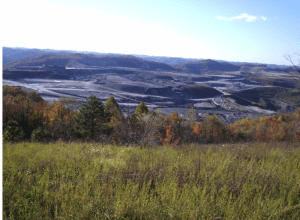Blog >> Voices from the Mountains: Activist Ethics & Mountaintop Removal Mining
Voices from the Mountains: Activist Ethics & Mountaintop Removal Mining
This is an excerpt of an article that appeared in the spring 2013 special issue on “Thinking Activism” of Trans-Scripts: An Interdisciplinary Online Journal in the Humanities and Social Sciences.
Mountaintop removal mining (MTR) is a major ethical issue emerging from Appalachia. As an environmental, economic, health, safety, and political issue, this form of mining has sparked much protest since it began in the 1960s, and increased in the 1990s. In 2011, the EPA officially acknowledged the hazards of MTR:
Mountaintop mining is a form of surface coal mining in which explosives are used to access coal seams, generating large volumes of waste that bury adjacent streams. …It is estimated that almost 2,000 miles of Appalachian headwater streams have been buried by mountaintop coal mining.
Here, I critically examine the possibilities and limitations of activism vis-à-vis MTR in order to offer an ethical model of advocacy centered on the rhetorical art of attunement. In Fall 2007, an undergraduate course in Appalachian Literature inspired me to conduct interviews with families affected by mountaintop removal mining in eastern Kentucky. The article you read today was written five years later, after greater reflection on that journey.
Attunement is a generative metaphor for activist research. The term has been cited often in the Humanities to represent a special kind of rhetorical listening that attends to difference, respect, collaboration, and community engagement. In music, tuning connotes a recognition of rhythm and a movement towards harmony not merely through sounds, but also through vibrations that are felt as much as they are heard. The impact of sound and vibration on the body creates felt senses that permeate past the skin, often beyond consciousness—passing through and embedding into bodily memory: inspiring response. As a practice, then, attunement hinges on one’s ability to acknowledge and adjust within an environment.
Taking Appalachia as my primary example in this text, I advocate “attunement” as an ethical research methodology that holds activists responsible for carefully listening to the many voices surrounding an issue. We are always attuning ourselves—to available materials, historical tensions, social relations, and rhetorical possibilities. Ethical attunement is a generative metaphor because it implies response-ability towards others, and an openness to change.
Nowhere are issues of such ethical attunement more “audible” in Appalachia than in the debates around mountaintop removal mining (MTR). I took the image below during a road-trip that I can only describe as a “drive of academic activism.” After reading about the many families displaced by MTR in a collection titled, Missing Mountains, I felt a personal need to write and write and write about the problem, spreading the word to other academics. Encouraged by my undergraduate English professor, Sherry Cook Stanforth, I drove on highways for four hours to Black Mountain near Whitesburg, Kentucky, ascended a number of winding gravel roads, and met Sam and Evelyn Gilbert, the generous owners of the  mountainside adjacent to the one pictured here. Now a long stretch of grey dust lined up horizontally against the sky, this mountain range has been the couple’s home for over three decades. They fell in love and raised their children here. “The mountains,” Sam explained, “have been a big part of our life. To see them destroyed is sort of like having someone you’re dear to die. It’s just unbelievable. I don’t like to use the word hate, but that’s probably the only one appropriate for the way I feel towards these companies that do this just for greed. I believe we need new restrictions and laws.”
mountainside adjacent to the one pictured here. Now a long stretch of grey dust lined up horizontally against the sky, this mountain range has been the couple’s home for over three decades. They fell in love and raised their children here. “The mountains,” Sam explained, “have been a big part of our life. To see them destroyed is sort of like having someone you’re dear to die. It’s just unbelievable. I don’t like to use the word hate, but that’s probably the only one appropriate for the way I feel towards these companies that do this just for greed. I believe we need new restrictions and laws.”
The opportunity to view this phenomenon is rare. Sam, a retired strip miner, had just closed dispute with the Upper Cumberland River Coal Company regarding their proposal to place a hollow fill and sedimentation pond 250 feet behind his house. The proximity of this problem to his family’s well-being inspired him to invite others to see the devastation for themselves. But for people beyond the mountains, this form of mining is practically invisible. Back at home, switching on my office lights, making coffee, and typing on this laptop remove me so completely from MTR practices that activism becomes that much more difficult—and complicated. As the industry proclaims: “Coal keeps the lights on.” For the state of Kentucky, their claim is literally true: “There are 21 major coal-burning electric generating plants in Kentucky, and almost all (92.7%) of Kentucky’s electricity is generated from coal.” And despite the extreme importance of Sam and Evelyn Gilbert’s story, such statistics increase the complexity of “taking a side” in the MTR debate.
Despite my anger at the changing landscape of my home state, I am suspicious of my reaction to immediately agree and be moved by cries against MTR. For groups resisting mountaintop removal mining don’t merely resist against big, bad corporations from the bottom-up, but also enact their own kind of power—namely, a composed power of collectivism that I like better, but that does de-emphasize the diversity that exists within this conflict. In other words, collectivism—even resistant collectivism—is also power-driven. (I may be against MTR, but I still need my laptop! I may love these mountains I grew up in, but I still need to provide for my family, and mining is the only profitable work in our community). As an outsider traveling into a small Kentucky community, I observed both strong and subtle tensions surrounding MTR. One town member explained that if outsiders were to come in waving an anti-mountaintop-removal flag, even those opposing it would feel uncomfortable in joining the cause because of the tension to support neighbors over outsiders, especially when so many neighbors are coal miners.
Bodies are always situated within larger networks of power relations. From the perspective of the townsperson who cautioned me against waving an anti-MTR flag, the best solution may not be to be a diehard activist, but rather to bring awareness to those who don’t know that the problem exists, and to help disrespected or unvoiced voices be heard. As a researcher in this scene, I attuned myself to the people who lived in communities impacted by MTR, and negotiated my activist stance against MTR alongside a desire to respect those communities. Attunement, in this way, can be understood as awareness catalyzed by rhetorical choices.
Maurice Manning, an author from Missing Mountains, expressed in a phone interview with me that “language, and the culture that is associated with the language, is the greatest natural resource in eastern Kentucky. …The human relationship to the landscape is what produces the language, in my opinion.” Such awareness inspires the rhetorical choices he makes in his poetry, which is academic, activist, and ethical:
You like
that kind of landscape, alright, you like it
right good, the beauty, the treachery;
it’s what your life has been and all
it’s ever going to be: a rise, a fall, and after that, you
have good reason to want another rise (Missing Mountains 74-75).
The relationship between language and landscape in this poem reveals not only the ecological and geological impacts of mountaintop removal, but also the cultural and historical importance of the mountains to Appalachian people.
Rhetoric, in these ways, is essential to an ethic of attunement because it reveals the subtleties of power and at the same time enacts a powerful activism of its own. Both pro- and anti-MTR collectivism emphasize binary tension and strip away local diversity, conflict, and flux: any given town in Appalachia is home to supporters or activists who are torn by economic hardship, family heritage in coal mining, the need for electricity (within and of course, beyond Appalachia), connections to the mountains, needs for consistently clean water, and many other struggles. In other words, at the conflict-site between individual “stance” and national “movement”—at the moment, for instance, that a person says she is for or against MTR—there occurs an erasure of diversity, partiality, anxiety, and neighborly tension. In such moments of activist erasure, we might attune ourselves to these tensions, remembering that the self is always unstable and partial, and at the same time embedded within a diversity of pressures to act and respond.

Multiple tensions surround mountaintop removal mining. For coal companies (whose major web presences include www.americaspower.org and www.friendsofcoal.org), the phrase “Coal Keeps the Lights On” is circulated on billboards and bumper-stickers, and at the annual college football “Friends of Coal” Bowl. In fact, as I drove out of Whitesburg, Kentucky one last powerful image struck me: On the side of a coal truck were the words, “The Power to Move Mountains.” People fighting against mountaintop removal re-propagate such slogans for negative publicity, as visible in the billboard above that reads: “The Power to Move Mountains… belongs to God.”
This text is not meant to offer a solution to the complexities of MTR, but to reveal the complications of activism and suggest ways we might acknowledge and accept diverse tensions even as we take stances and become activists. Rhetoric, or the potential of language to create change, offers strategies for harnessing the emotive and symbolic powers of place—especially for activists, researchers, and lay people supporting places that are not frequently offered respect. The stories we tell—and the ways we tell them—can help advocates, artists, and community members build “strategic lateral relationships among peoples, places, and ideas that transcend social, spatial, and ideological barricades.” Using the idea of attunement rhetorically, we storytellers can support communities facing histories of oppression and negative representation.




